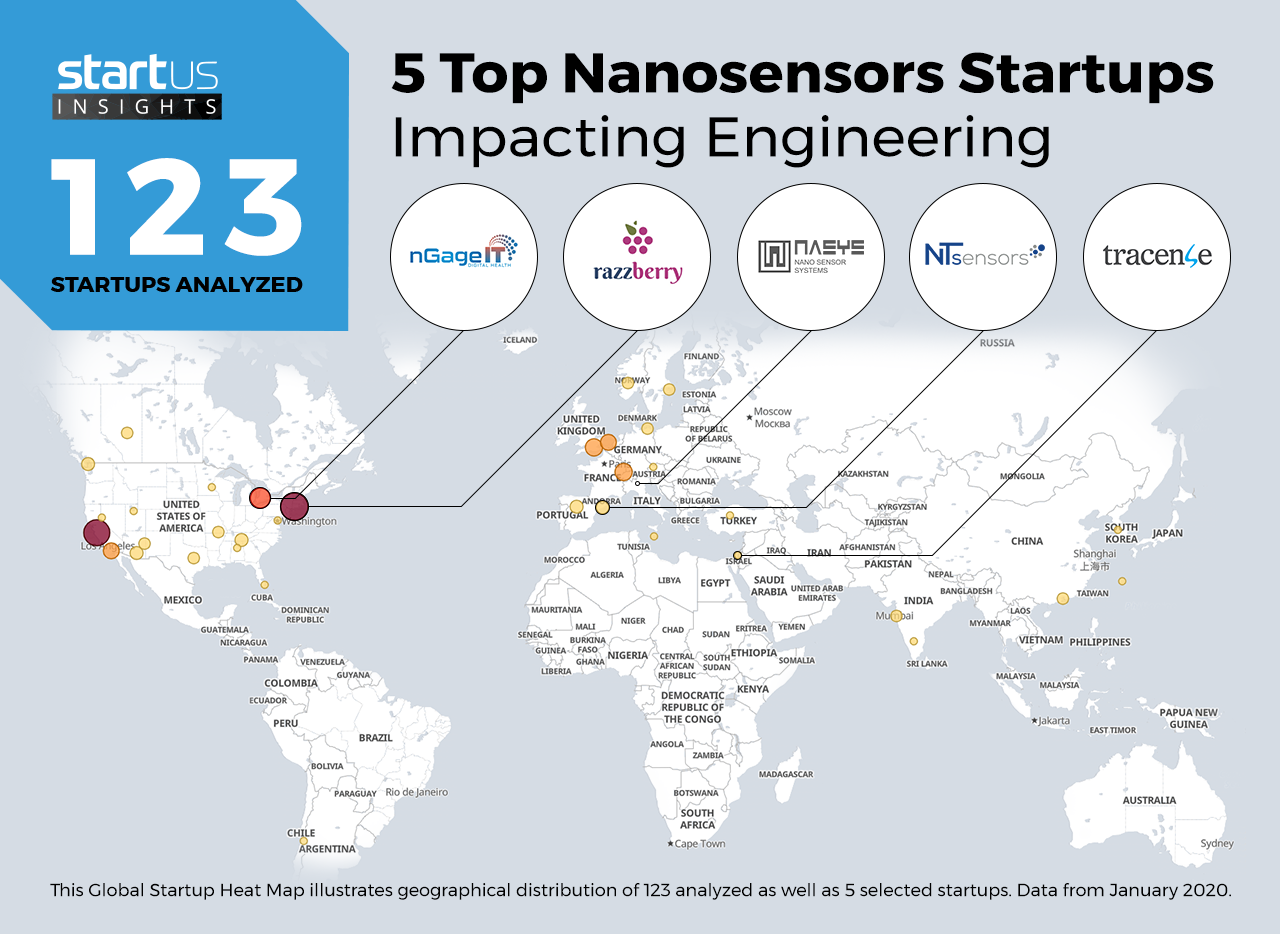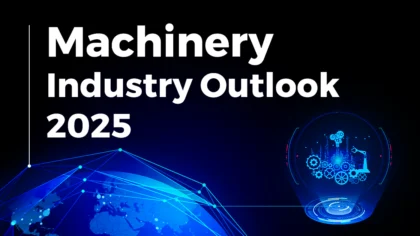Our Innovation Analysts recently looked into emerging technologies and up-and-coming startups working on solutions for the engineering sector. As there is a large number of startups working on a wide variety of solutions, we want to share our insights with you. This time, we are taking a look at 5 promising nanosensors startups.
Heat Map: 5 Top Nanosensors Startups
For our 5 top picks, we used a data-driven startup scouting approach to identify the most relevant solutions globally. The Global Startup Heat Map below highlights 5 interesting examples out of 123 relevant solutions. Depending on your specific needs, your top picks might look entirely different.
Razzberry – Chemical Structure Tracking
Chemical nanosensors detect the chemical or material composition of food, water, environmental, and medical samples to name a few. These nanosensors use extremely sensitive chemical receptors and transducers and can identify toxins and chemical compounds. They can detect concentrations as low as parts per million (ppm) to parts per billion (ppb).
The US-based startup Razzberry develops printed and portable chemical nanosensors to trace real-time chemical changes in water, soil, and environment. Besides, the startup plans to expand into the areas of distributed nanosensor networks and lab-on-a-chip applications.
NT Sensors – Precision Agriculture Monitoring
During poor agricultural seasons, any lack of sufficient fertilizers and nutrients usually leads to massive declines in the harvest. One solution involves the use of precision agriculture nanotechnology sensors that monitor proper macronutrients and water content. This facilitates optimal maturation, fertilization, and crop productivity.
Spanish startup NT Sensors offers a range of nanotube-based sensors that quantify the ion concentration of agricultural cultivation samples in real-time. The company’s nanosensors provide insights into the ionic strength of the drainage, identify waste points, and aim at increasing crop performance.
Nasys – Air Composition Detection
Air pollution is an increasingly worrying problem in modern cities and polluting gases affects people’s health daily. With advancements in nanotechnology, nanosensors can now detect minuscule amounts of specific gases in the atmosphere. This can help maintain safe living and working conditions and prevent negative health consequences.
Italian startup Nasys develops customized gas nanotechnology sensors. These nanowires or nanostructures are made of metal oxides and can be integrated into existing gas detectors and instruments. They identify the gas composition for domestic, industrial, or environmental use cases.
Tracense – Hazardous Materials Identification
Nowadays, many retail stores, airports, and infrastructure projects face real or false security encroachments and terrorist attacks. Threats usually come from hazardous materials stored inside carry-on luggage, personal belongings, or packages. Trace detectors that employ nanosensors can precisely screen various substances in diverse environments and, thus, prevent security violations.
Israel-based startup Tracense offers ultrasensitive nanotechnology sensors that detect potential threats in solid, liquid, and gaseous materials at nanolevel concentrations. Their technology combines nanowire arrays on a small semiconductor chip to create a field-effect transistor (FET) that is suitable for the detection of explosives.
nGageIT – Diseases Diagnostics
With recent developments in nanotechnology, biosensors can identify microscopic particles in viruses, cancer tissues, and infections in plants, animals, and humans. Such nanosensors are very useful for diagnosing diseases. Early-stage detection of diseases, sometimes even before symptoms appear, can save both medical costs and innumerable lives.
The US-based startup nGageIT develops diagnostics tools that employ biological nanosensors. Their proprietary real-time cloud processing engine, Digital Breath Biomarker, analyzes exhaled breath and detects health conditions and chronic diseases. The solution covers medication adherence and early-stage detection in healthcare.
What About The Other 118 Solutions?
While we believe data is key to creating insights it can be easy to be overwhelmed by it. Our ambition is to create a comprehensive overview and provide actionable innovation intelligence for your Proof of Concept (PoC), partnership, or investment targets. The 5 nanosensors startups showcased above are promising examples out of 123 we analyzed for this article. To identify the most relevant solutions based on your specific criteria and collaboration strategy, get in touch.










